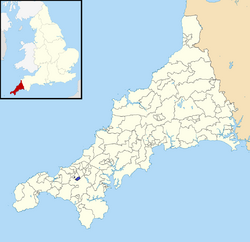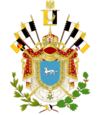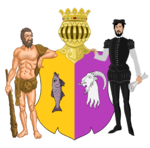Glynawan
Gwlaskor of Glynawan
Kingdom of The River Valley | |
|---|---|
| Anthem: Glynawan, our homeland' | |
 Map of Cornwall with Glynawan highlighted | |
| Capital | Imperial Centre |
| Largest city | Outer Penzancia |
| Official languages | English, Cornish |
| Recognised national languages | Cornish, English |
| Recognised regional languages | Cornish |
| Religion | No Official religion |
| Demonym(s) | Glynawanite |
| Government | Aristocracy |
| Thomas Bainbridge | |
• Myghtern | Kenneth V C. Fydtroust |
| Legislature | Witan Kussul of Glynawan |
| Establishment | |
• Signing of the Charter of Glynawan | 1 July 2019 |
• Congress of Glynawan | 1 September 2020 |
| Area | |
• Total | 0.032 km2 (0.012 sq mi) |
• Water (%) | 6% |
| Population | |
• Estimate | 14 |
| GDP (nominal) | £240 estimate |
• Total | £5,240 |
• Per capita | £40 |
| Currency | Mona |
| Time zone | GMT |
| Date format | dd-mm-yyyy; |
| Driving side | left |
| Calling code | +44 |
The Gwlaskor of Glynawan, more commonly known as Glynawan or the kingdom of Glynawan, is a micronation located in Cornwall. The kingdom of Glynawan is comprised of territory known as the Glynland, or territory directly ruled by the House of Glynawan, and feudally governed territory. Whilst still being relatively young in its independence the former region of the Fesmarian state has been a part in much of Fesmarian history.
The Gwlaskor of Glynawan was formed after the Penzancia crisis and fourth Fesmarian empire and is ruled by a multitude of different organisations and figures.
The Gwlaskor of Glynawan has a mostly agrarian, with much of the Principality's income coming from farming, but, other industries active within the Principality are Metal Smithing and Jeweling.
Etymology
The name Glynawan originates from the given name of the river it is primarily located along, the addition of awan is a mistranslation from Cornish to English, which has produced a multitude of names for the country and region.
Toponymy
The kingdom of Glynawan was named after the river Glyn, along with a small wooded area near to the river which sits in a valley. Whilst the name Glynawan is used in most cases, the actual name of the country is subject to translation, with different names existing in multiple languages and dialects. The name "kingdom of the River valley" and "the river kingdom" being two of the most commonly used translations, however the name used by most natives remains either "Glynawan" or "Glynavonvali". Other names used have been "Imperial centre" and "Valley of the Fesmarian capital" these names are no longer endorsed by the government however nominal use of them still remains particularly in regions which remained loyal to the Fesmarian crown.
History
2018
The region historically has been a part of the Fesmarian realm, being one of the first areas to be annexed into the Fesmarian republic in march 2018, under the name "Invictus Valley" however the name would change after the victory of the FCP in the first state run election. The region would remain under the name "Valley of the People" until December of that same year. The valley would and its iconic river would be involved in the battle of 'Fesmar Creek' during the continuation conflicts. The valley would later be used as the first staging point for the monarchist coup in the build up to the 'Summer war' often referred to as the Fesmarian civil war. In late 2018 the region was renamed to the still used "Imperial centre" which it continued to be referred to until July 2019.
2019 until independence
In January 2019 the region was officially designated one of the 'core' regions of the Fesmarian section of Fesmar-Trelawny a status which would become important in the coming period of strife. In April a selection of micronational leaders backed a coup attempt against the head of the Fesmarian empire at the time, Lewis II, this coup whilst initially defeated shattered the already cracking power structures within the Fesmarian state, within two days of the coup the 'kingdom of Senshi-Tochi' had declared its independence from the empire, and with the government still recovering from the attempted coup little opposition occurred which enticed regional governors to declare their own independence.
In the resulting aftermath of the coup, regions such as 'Stormhold' and 'Belgica' declared their independence, leaving regions such as 'Outer Roadrunnia' in a limbo of both existence and non-existence, during this crisis the region of "Imperial centre" saw a rise in nationalist sentiment, and calls were made for a new non-Fesmarian name to be introduced, these calls were quickly suppressed by the Fesmarian government who remained in a near constant state of panic at the rapid collapse of their territorial holdings. After the end of the crisis, which saw Fesmar shrink in its territorial claims by ~60%, the valley and its surrounding lands became increasingly involved and militarized as the new frontier for the Fesmarian state and people.
Principality of Glynawan
After the Fesmarian crisis, the nation of Fesmar was dissolved for a short period, this period saw the transfer of many Fesmarian officials to a new government located in the region which would become known as 'Glynawan'. The principality would last until the prince Kenneth III would declare a revival to the Fesmarian kingdom.
Geography
Location
Glynawan is located in central Cornwall on the western coast of the island of Great Britain. It is characterized by rolling rocky bluffs, forests, and numerous small rivers and streams, this geography serves important as it directly impacts the economy of Glynawan regarding its primary industry, Farming, and exports, Jewelry.
Climate
The climate of Glynawan is very much so related to that of the climate of Cornwall which causes hot summers and rainy springs and winters, with Autumn being both a mixture of summer and winter conditions.
| Climate data for Culdrose, Helston, (Record high and low and mean max and min 1996–2017), (1981-2010) | |||||||||||||
|---|---|---|---|---|---|---|---|---|---|---|---|---|---|
| Month | Jan | Feb | Mar | Apr | May | Jun | Jul | Aug | Sep | Oct | Nov | Dec | Year |
| Record high °C (°F) | 14.4 (58) |
13.9 (57) |
18.9 (66) |
18.9 (66) |
22.8 (73) |
21.7 (71) |
27.2 (81) |
25.6 (78) |
22.8 (73) |
22.8 (73) |
15.6 (60) |
14.4 (58) |
27.2 (81) |
| Average high °C (°F) | 9.2 (48.6) |
9.0 (48.2) |
10.2 (50.4) |
11.9 (53.4) |
14.6 (58.3) |
17.1 (62.8) |
19.0 (66.2) |
19.2 (66.6) |
17.4 (63.3) |
14.4 (57.9) |
11.7 (53.1) |
9.9 (49.8) |
13.63 (56.54) |
| Average low °C (°F) | 4.1 (39.4) |
3.7 (38.7) |
4.8 (40.6) |
5.6 (42.1) |
8.3 (46.9) |
10.7 (51.3) |
12.8 (55) |
12.9 (55.2) |
11.2 (52.2) |
9.2 (48.6) |
6.6 (43.9) |
4.8 (40.6) |
7.89 (46.21) |
| Record low °C (°F) | -7.2 (19) |
-5 (23) |
-3.3 (26) |
-3.3 (26) |
2.2 (36) |
7.8 (46) |
5 (41) |
6.1 (43) |
5 (41) |
0 (32) |
-6.1 (21) |
-5 (23) |
−7.2 (19) |
| Average Rainfall mm (inches) | 113.4 (4.465) |
80.4 (3.165) |
80.2 (3.157) |
67.2 (2.646) |
60 (2.362) |
60.5 (2.382) |
61.8 (2.433) |
67 (2.638) |
71.9 (2.831) |
105 (4.134) |
115.7 (4.555) |
115.9 (4.563) |
999 (39.331) |
| Average rainy days (≥ 1.0 mm) | 16.5 | 12.4 | 13.0 | 11.6 | 9.9 | 8.7 | 10.0 | 10.7 | 10.2 | 15.2 | 15.8 | 16.2 | 150.2 |
| Sunshine hours | 56.6 | 79.7 | 109.7 | 177.8 | 205.9 | 202.7 | 197.2 | 192.0 | 150.4 | 105.7 | 76.3 | 54.2 | 1,608.2 |
| Source no. 1: Wunderground[1] | |||||||||||||
| Source no. 2: MeteoFrance[2][3] | |||||||||||||
Government and Politics
The Glynawan maintains a mixed Oligarchy and Monarchy, with absolute power being held by the Myghtern however a group of powerful ministers maintains nominal authority over the ruling of the state. The state also operates with a handful of foreign advisors within the government. Members of the Grand Republic of Cycoldia notably retain fixed government station in Glynawan.
Witan Kussul Members
| Portrait | Name | Term of office | Position |
|---|---|---|---|

|
Myghtern Morwenna V Fydtroust | Established - Present | Monarch |

|
HYH Yurl Dougie of Devon | Established - Present | Grand Speaker of the Fesmarians |

|
HIH Thomas I Bainbridge | Established - Present | Imperator Fesmarae Glynawan |

|
HYH Yurl Dougie of Devon | Established - Present | Yurl of Devon |

|
HDH Duke David 'The Tall' Ainsworth | Established - Present | Duke of the Northern March |

|
SH Roadrunner of Stormhold | Established - Present | Witan Seat Holder |

|
RHL Christina Nowell | Established - Present | Cycoldian Advisor and Witan Seat Holder |
References
- ↑ https://web.archive.org/web/20180505185741/https://www.wunderground.com/history/airport/EGDR/2018/1/1/MonthlyCalendar.html?req_city=Culdrose&req_state=&req_statename=United%20Kingdom&reqdb.zip=00000&reqdb.magic=32&reqdb.wmo=03809. Archived from the original on 5 May 2018. Retrieved 1 February 2017. Unknown parameter
|url-status=ignored (help); Missing or empty|title=(help) - ↑ "METEO %%% par Météo-France- Prévisions météo du monde gratuites à 10 jours". www.meteofrance.com.
- ↑ "UK climate averages". Met Office.

